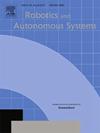与干扰和状态观测器相结合的机械手分数阶滑动模式控制
IF 4.3
2区 计算机科学
Q1 AUTOMATION & CONTROL SYSTEMS
引用次数: 0
摘要
本文提出了一种基于扰动和状态观测器的机械手分数阶滑动模态控制(FSMC)方法。首先,设计了一个能估计速度和加速度的状态估计器,只需要关节位置反馈和机械手的数学模型。状态估计器在有限时间内收敛。然后,设计干扰观测器。通过设计机械手的标称系统模型,在闭环控制中引入干扰观测误差,使机械手的性能能够跟踪标称系统。最后,还设计了基于分数微分算子理论的滑动模式控制器(SMC)。控制器推导过程中的滑模变量值由机械手轨迹跟踪误差的分数导数组成,而分数微分运算在实现过程中使用积分,积分是低通滤波器,因此可以抑制高频噪声。在实验部分,将所设计的方法与传统的滑动模式进行了比较,进一步揭示了 FSMC 的快速性和控制精度。本文章由计算机程序翻译,如有差异,请以英文原文为准。
Fractional-order sliding mode control of manipulator combined with disturbance and state observer
A fractional-order sliding mode control (FSMC) method for a manipulator based on disturbance and state observers is proposed. First, a state estimator is designed that can estimate the velocity and acceleration, and only joint position feedback and the mathematical model of the manipulator are needed. The state estimator converges in finite time. Then, the disturbance observer is designed. By designing the nominal system model of the manipulator, a disturbance observation error is introduced into the closed-loop control so that the performance of the manipulator can track the nominal system. Finally, a sliding mode controller (SMC) based on the fractional differential operator theory is also designed. The value of the sliding mode variable in the derivation of the controller is composed of the fractional derivative of the trajectory tracking error of the manipulator, whereas the fractional differentiation operation uses integration in its realization, and the integration is a low-pass filter, thus, high-frequency noise is suppressed. In the experimental section, the method designed is compared with the conventional sliding mode, which further reveals the rapidity and control accuracy of FSMC.
求助全文
通过发布文献求助,成功后即可免费获取论文全文。
去求助
来源期刊

Robotics and Autonomous Systems
工程技术-机器人学
CiteScore
9.00
自引率
7.00%
发文量
164
审稿时长
4.5 months
期刊介绍:
Robotics and Autonomous Systems will carry articles describing fundamental developments in the field of robotics, with special emphasis on autonomous systems. An important goal of this journal is to extend the state of the art in both symbolic and sensory based robot control and learning in the context of autonomous systems.
Robotics and Autonomous Systems will carry articles on the theoretical, computational and experimental aspects of autonomous systems, or modules of such systems.
 求助内容:
求助内容: 应助结果提醒方式:
应助结果提醒方式:


